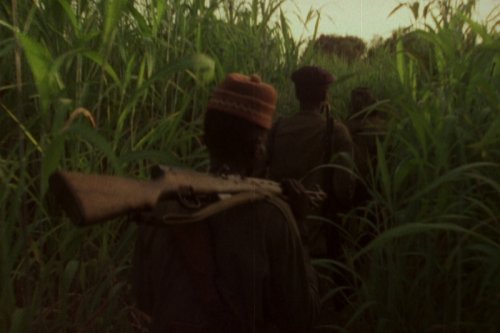Reviews - Concerning Violence
Concerning Violence
Reviewed By John Porter

Concerning Violence
Beginning with a heavy, academic monologue from a lecturer dwarfed by piles of books, Goran Olsson's 'Concerning Violence' makes no attempt to present itself as an easy watch. As it progresses however academia swiftly gives way to something more primal, and the end result falls somewhere between a rattling of cages and a call to arms. The scholarly tone of the introduction is a stark contrast to the proceeding images: A helicopter flies low over African farm land while western soldiers take pot shots at the fleeing cattle below. Landing, the soldiers find the cow in death throes and finish it off at point blank range. The camera never cuts from the animal’s face, nor are we spared seeing the bullet enter and the resultant blood flop out. There is no denying that 'Concerning Violence' is a fearless, visceral movie. In our sanitised, western-orientated media, witnessing actual brutality is becoming rare despite its prevalence across the world, and it is a testament to the uncompromising stance of 'Concerning Violence' that it made me wonder why this is so.
Frantz Fanon's 1961 book 'The Wretched of the Earth' is the framework for Olsson's study on imperialism, revolution, and violence, and the movie is organised around Fanon’s philosophy. Statements are numbered and initially laid onto the screen as text like a manifesto, allowing us to follow along with Lauryn Hill’s obviously African-American voice. As the documentary footage under the text becomes more pointed toward the voiceover, the text disappears and we are left with narration and pictures, moving from words to actions, theory to reality.
The content of the narration is forceful, often lyrical, with an intense message as to the situation of oppression in the Third World, and the subsequent case for violent revolution. The tools of the imperialist are laid out with simplicity: The dehumanisation and repression of populations, the stealing of resources and suppression of native culture by multinationals and missionaries, and the historical background of the slave trade. Using grainy 1960s and 70s newsreel footage, we see jungle fighters and tracer bullets in the dark, tattooed faces, filed teeth, and rifles slung over black shoulders. We see entire families dumped on the side of the road, the casual racism and looks of scorn from the white ruling classes in Rhodesia, and subservience from black waiters and golf caddies. The movie gradually integrates case studies of nations regaining independence through violence, combining Fanon’s thoughts with history. Through the measured yet seething prose of ‘The Wretched of the Earth’, and the boiling down of sides to ‘Coloniser’ and ‘Colonised’, ‘Concerning Violence’ is presented not as a multitude of small revolutionary wars, but as one single struggle for the African continent. This is a movie which is attempting to do justice to the vast scope of its literary source and social context.
At times the film recalls the South American classic 'La hora de los hornos/Hour of the Furnaces' (1968, Octavio Getino and Fernando Solanas) and the attitudes of Che Guevara, yet scant mention is made of any occurrence beyond Africa between 1950 and 1987. This may distance it somewhat from the continuing imperialism across the globe, but being a historical document forces the viewer to personally draw the uncomfortable parallels between the past, from the slave ships through the empires, to the injustices still prevalent against the Third World today.
Peter Bradshaw poses the interesting question of why didn't anyone tell the Poles or Russians to use non-violence when Hitler invaded? Indeed, the resistance fighters of Europe are treated like saviours for their violent deeds in the Second World War. Why is violent resistance against an occupying power in the Third World any different? The justification of violence in any form is a thorny subject, and the hypocrisies which ‘Concerning Violence’ makes us face do not sit easily while we eat our bananas, drink our cocoa, and spin our rings of precious metals. Perhaps what the movie ultimately aims to do is make Fanon's work accessible, yet this requires western audiences to do what perpetrators of colonialism are unable to: Simply look at the world from another’s perspective.
Frantz Fanon's 1961 book 'The Wretched of the Earth' is the framework for Olsson's study on imperialism, revolution, and violence, and the movie is organised around Fanon’s philosophy. Statements are numbered and initially laid onto the screen as text like a manifesto, allowing us to follow along with Lauryn Hill’s obviously African-American voice. As the documentary footage under the text becomes more pointed toward the voiceover, the text disappears and we are left with narration and pictures, moving from words to actions, theory to reality.
The content of the narration is forceful, often lyrical, with an intense message as to the situation of oppression in the Third World, and the subsequent case for violent revolution. The tools of the imperialist are laid out with simplicity: The dehumanisation and repression of populations, the stealing of resources and suppression of native culture by multinationals and missionaries, and the historical background of the slave trade. Using grainy 1960s and 70s newsreel footage, we see jungle fighters and tracer bullets in the dark, tattooed faces, filed teeth, and rifles slung over black shoulders. We see entire families dumped on the side of the road, the casual racism and looks of scorn from the white ruling classes in Rhodesia, and subservience from black waiters and golf caddies. The movie gradually integrates case studies of nations regaining independence through violence, combining Fanon’s thoughts with history. Through the measured yet seething prose of ‘The Wretched of the Earth’, and the boiling down of sides to ‘Coloniser’ and ‘Colonised’, ‘Concerning Violence’ is presented not as a multitude of small revolutionary wars, but as one single struggle for the African continent. This is a movie which is attempting to do justice to the vast scope of its literary source and social context.
At times the film recalls the South American classic 'La hora de los hornos/Hour of the Furnaces' (1968, Octavio Getino and Fernando Solanas) and the attitudes of Che Guevara, yet scant mention is made of any occurrence beyond Africa between 1950 and 1987. This may distance it somewhat from the continuing imperialism across the globe, but being a historical document forces the viewer to personally draw the uncomfortable parallels between the past, from the slave ships through the empires, to the injustices still prevalent against the Third World today.
Peter Bradshaw poses the interesting question of why didn't anyone tell the Poles or Russians to use non-violence when Hitler invaded? Indeed, the resistance fighters of Europe are treated like saviours for their violent deeds in the Second World War. Why is violent resistance against an occupying power in the Third World any different? The justification of violence in any form is a thorny subject, and the hypocrisies which ‘Concerning Violence’ makes us face do not sit easily while we eat our bananas, drink our cocoa, and spin our rings of precious metals. Perhaps what the movie ultimately aims to do is make Fanon's work accessible, yet this requires western audiences to do what perpetrators of colonialism are unable to: Simply look at the world from another’s perspective.
Find A Film
Search over 1500 films in the Keswick Film Club archive.
Friends
KFC is friends with Caldbeck Area Film Society and Brampton Film Club and members share benefits across all organisations
Awards
Keswick Film Club won the Best New Film Society at the British Federation Of Film Societies awards in 2000.
Since then, the club has won Film Society Of The Year and awards for Best Programme four times and Best Website twice.
We have also received numerous Distinctions and Commendations in categories including marketing, programming and website.
 Talking Pictures
The KFC Newsletter
Talking Pictures
The KFC Newsletter
Links Explore the internet with Keswick Film Club


